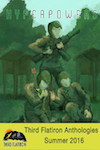 Editor's
Note: If you enjoyed this story, you might be interested in
reading the whole anthology, Hyperpowers, with many more great
stories. It's available
on Amazon
and Smashwords.
Editor's
Note: If you enjoyed this story, you might be interested in
reading the whole anthology, Hyperpowers, with many more great
stories. It's available
on Amazon
and Smashwords.1. Can you tell us a little what your story, "Grid Drop" is about?
"Grid Drop" fits into a cycle of short stories I'm writing about a future called the Fallowing that I hope to turn into a novel. Essentially, a group of humans decides that we have done enough damage to the biosphere and leave the planet to heal for 500 years. "Grid Drop" falls into about two or three centuries after the initial leavetaking. Since the major grids are down and most of the work of depopulating the planet has taken place, now small teams of commandos go in and take out what little civilization remains. But the Fallowing is not so simple as that, and the story addresses some of the complexities of the Fallowing. Two other Fallowing stories, "Winter Count" and "Regenesis," will be coming out in different media later this year.
2. How did you come up with the idea?
Most of what I write comes from an ecological perspective. I am very active in environmental issues and write for environmental groups as well as my short fiction. I want readers to look at what we're doing to our shared environment and consider our impact individually and collectively. We are doing a great deal of damage to the biosphere, with negative effects for ourselves and the nonhuman animals with whom we share the planet. There is a new form of science fiction called climate fiction, or cli-fi, and I hope to add my voice to that growing body of work and help improve our actions ecologically.
3. What is your inspiration for writing as a whole?
I've been writing since high school. I love the forms of science fiction and fantasy--you can really let your imagination soar. I also love writing about my outdoor experiences. I just enjoy writing, always have. I think as I grew up and attended college and later achieved an MA in Literature, I wanted my writing to serve a greater purpose. That's why I primarily focus on environmental issues, bringing them to people's attention. But the message can't overwhelm the story. I look to writers like Ursula K. Le Guin and Kim Stanley Robinson as examples of how to write engagingly about these issues.
4. Could you tell us a bit about yourself?
I was born in the remote canyons of eastern Utah, a little town called Moab. My father was a 28-year veteran of the United States Air Force, and we lived in a series of low-population places as he worked on nuclear weapons. I moved a lot, attended 13 schools over 12 grades. I've always been close to nature, doing a lot of camping, hiking, exploring. I spent a lot of summers in Moab with my grandfather who was a big outdoorsman, so I got bit by that bug early. He and my grandmother were both avid readers. I attended high school and college in South Dakota, a beautiful and pretty empty state. I spent a lot of time in the Black Hills as a kid. I now live in Las Vegas, Nevada. My primary job is in a fine dining restaurant. But I spend a lot of time in Nevada's backcountry. People tend to think Las Vegas is just casinos and partying, but Nevada is second only to Alaska in mountain ranges. There is so much wonderful outdoor opportunity here. It's inspiring. It fires me up, makes me want to write.
5. Where can listeners find more of your work?
Thus far I've had two stories published by Third Flatiron. I hope to have more. :-) My work has also been published at Another Realm, Expanded Horizons, Texas Books in Review, and Southwestern American Literature. I also blog frequently on environmental issues for "We Are Wildness" at wearewildness.com/blog. And I have a chapter in the book Critical Insights: Louise Erdrich, on environmental issues in the work of the Anishinaabe writer.
6. Any new work we should keep an eye out for?
Two new Fallowing stories coming out later this year, one, "Winter Count," in the collection Winter Wolves, from which most of the proceeds will go to organizations working to protect wolves. I also have a series of six essays about the western Arctic I wrote for the Conservation Lands Foundation going up on their website over the next two months, at westernarctic.org. I also had a recent blog published by fellow science fiction and fantasy author Dan Koboldt on wolves in literature: https://dankoboldt.com/writing-wolves-fairly/. I'm also well into another Fallowing story, an homage to Jean Giono's The Man Who Planted Trees.
7. (And just for Juli's curiosity: What are you reading now?)
I don't think anyone can write well who doesn't read well. I recently finished Paolo Bacigalupi's The Water Knife, which was spectacular. I'm working through Book Two of Mark Lawrence's "The Red Queen's War." I'm always reading something by Dostoevsky. I'm on book 17 of C J Cherryh's "Foreigner" cycle. I think she's the greatest science fiction writer of all time. And I'm always reading something environmental, doing research for The Fallowing. Right now that's Craig Childs' Apocalyptic Planet. If you haven't read Craig Childs' work I highly recommend you do.
 Editor's
Note: If you enjoyed this story, you might be interested in
reading the whole anthology, Hyperpowers, with many more great
stories. It's available
on Amazon
and Smashwords.
Editor's
Note: If you enjoyed this story, you might be interested in
reading the whole anthology, Hyperpowers, with many more great
stories. It's available
on Amazon
and Smashwords.
Copyright Third Flatiron Publishing 2021
https://www.thirdflatiron.com
Please support our creators!